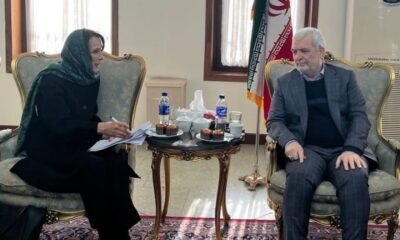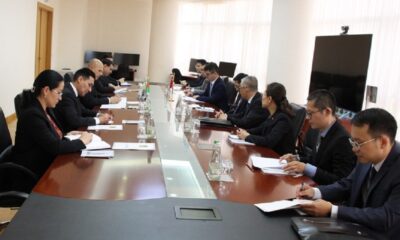Health
WHO says infertility affects 1 in 6 globally, calls for more consistent data

About one in six adults globally have experienced infertility at least once in their life, the World Health Organization (WHO) said in a report on Monday, urging countries to actively collect more consistent data on the disease, Reuters reported.
The report analyzed existing studies conducted from 1990 to 2021 and showed that about 17.5% of adults across the world were affected by the inability to have a child. WHO officials said the report takes into account several research approaches.
"The sheer proportion of people affected show the need to widen access to fertility care and ensure this issue is no longer sidelined in health research and policy," said the U.N. health agency's chief, Tedros Adhanom Ghebreyesus.
The WHO defines infertility as a disease of the male or female reproductive system that is defined by the failure to achieve a pregnancy after 12 months or more of regular unprotected sexual intercourse.
There was no evidence of increasing rates of infertility between 1990 and 2021, the global health agency's unit head for Contraception and Fertility Care, James Kiarie, told journalists on a call.
"Based on the data we have, we cannot say that infertility is increasing or constant ... the jury's still out on that question," he said, citing that data so far has been mixed and inconsistent.
The report highlights the need for countries to collect and share consistent data on infertility, separated by age and cause, as well as information on those who need fertility care, Reuters reported.
About 17.8% of adults in high-income countries have experienced infertility at least once and about 16.5% of adults in low- and middle-income countries, according to the report.
Health
Muttaqi appeals to WHO to help strengthen Afghanistan’s health sector
Hanan Balkhy, the World Health Organization’s director for the Eastern Mediterranean Regional Office, met in Kabul this week for talks with Amir Khan Muttaqi, the IEA’s foreign minister
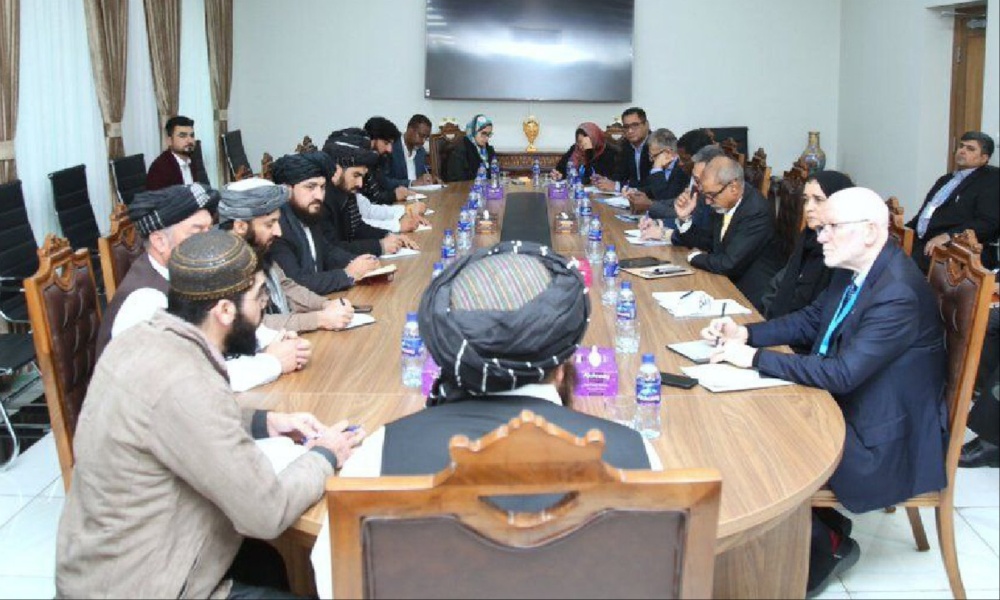
The Islamic Emirate has appealed to the World Health Organization to equip and strengthen Afghanistan’s health sector and to support Afghanistan’s pharmaceutical production sector.
Dr. Hanan Balkhy, the World Health Organization's director for the Eastern Mediterranean Regional Office, met in Kabul this week for talks with Amir Khan Muttaqi, the IEA’s foreign minister.
During the meeting, Muttaqi asked the World Health Organization to assist Afghanistan and to help it achieve self-sufficiency in the pharmaceutical production sector.
Balkhy meanwhile said that he was trying to garner support for Afghanistan from leading health experts around the world.
Christopher Elias, head of global development for the Bill Gates Foundation, also attended this meeting and said his organization was trying to take effective measures to eliminate the polio virus in Afghanistan.
Polio cases increase
Elias’ comment comes after the WHO stated that the forced repatriation of Afghan nationals from Pakistan was a “major setback” for polio eradication efforts and that it contributed to the regional resurgence of the disease.
Pakistan and Afghanistan are the only two polio-endemic nations in the world and so far this year, the two countries have reported 49 and 23 cases respectively; up from only six cases each in 2023.
The latest case in Pakistan was confirmed last week in the southwestern province of Balochistan, which sits on the Afghan border and accounts for half the cases reported in 2024.
The United Nations High Commissioner for Refugees has said that Pakistan's crackdown on undocumented foreign nationals has resulted in more than 730,000 Afghan migrants returning to Afghanistan since August 2023.
Health
UNICEF ensures 6.1 million people have access to basic health services in Afghanistan

More than six million people accessed essential health and nutrition services at UNICEF-supported health facilities last month, the UN agency said in its latest Humanitarian Situation Report for September 1 to 30.
UNICEF said of the 6.1 million people who accessed essential health and nutrition services, half of them were children under the age of five.
In addition, 50 schools in 10 provinces gained access to safe water, handwashing facilities, and newly constructed or rehabilitated toilet facilities.
However, as of September, UNICEF’s Humanitarian Action for Children (HAC) appeal for children in Afghanistan is only 41 percent funded.
Afghanistan remains one of the world’s largest humanitarian crises, with 23.7 million people in need of humanitarian assistance following decades of conflict, extreme climate shocks, and severe economic decline.
UNICEF also stated that this year, 33 percent of the population receives most of their income from unsustainable income sources, compared to 26 percent in 2023.
Health
Polio vaccination campaign kicks off in Afghanistan

Public Health Ministry officials have confirmed that a polio vaccine campaign across 16 provinces was launched on Monday.
Sharaft Zaman Amarkhil, the spokesperson of the Ministry of Public Health, says that the campaign got underway on Monday in a number of provinces including Kabul, Kandahar, Helmand, Uruzgan, Zabul, Farah, Nangarhar, Laghman, Kunar, Nuristan and some other provinces.
Amarkhil said the campaign will last for three days and an estimated 6.2 million children under the age of five will receive the anti-polio vaccine.
Zaman called on parents, religious scholars and ethnic elders to cooperate with the ministry's vaccinators in implementing the anti-polio vaccination campaign for children under five years old in the mentioned provinces.
The World Health Organization meanwhile published its latest Polio Bulletin on Monday and confirmed Afghanistan has recorded 23 cases of Wild Polio Virus so far this year.
Pakistan meanwhile reported two new cases this week - one in Khyber Pakhtunkhwa province and the other in Balochistan province.
Pakistan has recorded a total of 41 cases of polio so far this year, bringing the total between the two countries to 64, against last year’s total of 12 (Afghanistan 6 and Pakistan 6).
World Polio Day
Marking World Polio Day last week, UNICEF pointed out that the current data issues a stark warning that the life-threatening disease continues to thrive in areas where conflict, natural disasters, humanitarian crises, and other destabilizing factors make it difficult to deliver critical healthcare.
“In conflict, children face more than bombs and bullets; they are at risk of deadly diseases that should no longer exist,” said UNICEF Executive Director Catherine Russell.
“In many countries, we are witnessing the collapse of healthcare systems, destruction of water and sanitation infrastructure, and the displacement of families, triggering a resurgence of diseases like polio. Children are being left paralyzed, unable to walk, play, or attend school."
A global decline in childhood immunization has also led to an increase in polio outbreaks, including in countries that had been polio-free for decades.
Nowhere is this more evident than in conflict-affected areas, with 15 out of 21 such countries – including Afghanistan, Democratic Republic of Congo, Somalia, South Sudan, and Yemen – currently battling polio.
In recent months, UNICEF and partners have intensified emergency responses to surges in polio outbreaks.
In Gaza, for example, UNICEF, in partnership with WHO, reached nearly 600,000 children under 10 years during the first round of a polio vaccination campaign in mid-September. The second and final round has been successfully implemented in south and central Gaza, but renewed mass displacement and bombings have delayed the process in the north.
The campaign follows the return of polio to Gaza for the first time in 25 years.
-

 Sport4 days ago
Sport4 days agoAbu Dhabi’s thrilling T10 tournament just days away
-

 World5 days ago
World5 days agoBiden allows Ukraine to use US arms to strike inside Russia
-

 Sport4 days ago
Sport4 days agoAfghanistan beat UAE by 169 runs in U19 tri-series
-

 Latest News3 days ago
Latest News3 days agoTajikistan trumps Afghanistan 3-1 in football friendly
-
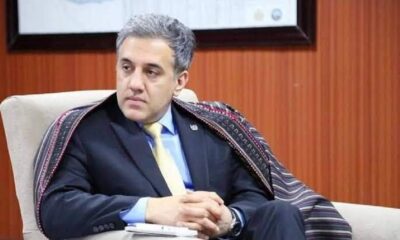
 Latest News4 days ago
Latest News4 days agoTwo Afghan diplomats posted to Germany under former government resign
-

 World3 days ago
World3 days agoLebanon, Hezbollah agree to US proposal for ceasefire with Israel, Lebanese official says
-
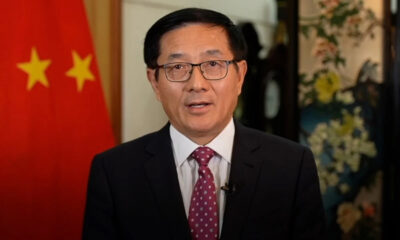
 Latest News4 days ago
Latest News4 days agoChina’s envoy says Beijing never interferes in Afghanistan’s internal affairs
-

 Latest News2 days ago
Latest News2 days agoEU marks International Children’s Day, says it supports Afghan children


